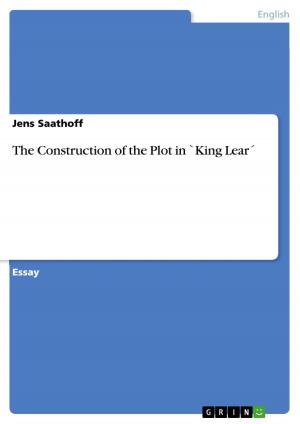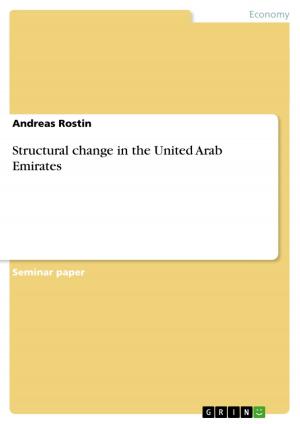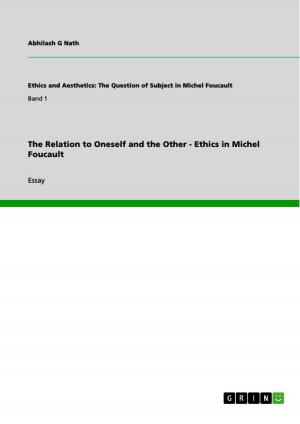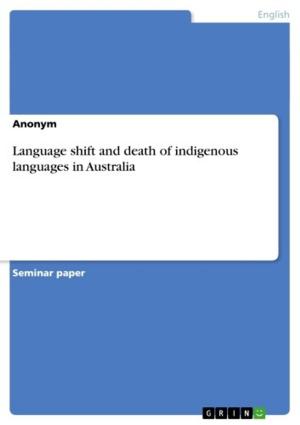Achebe`s Things Fall Apart- diagnosis of decay
Fiction & Literature, Literary Theory & Criticism, British| Author: | Andrea Fischer | ISBN: | 9783638234115 |
| Publisher: | GRIN Publishing | Publication: | March 8, 2003 |
| Imprint: | GRIN Publishing | Language: | English |
| Author: | Andrea Fischer |
| ISBN: | 9783638234115 |
| Publisher: | GRIN Publishing |
| Publication: | March 8, 2003 |
| Imprint: | GRIN Publishing |
| Language: | English |
Seminar paper from the year 2003 in the subject English Language and Literature Studies - Literature, grade: 2 (B), University of Tubingen (New Philology Fakulty), 5 entries in the bibliography, language: English, abstract: Things Fall Apart is Chinua Achebe`s first novel. It is about the land of the Ibo in the eastern region of present- day Nigeria, in the period between 1850- 1900. It is the period shortly before and after the arrival of the white men in this part of West Africa. Achebe`s nineteenth century Africa witnesses the end of an era and the beginning of twentieth century Europeanization, with all its implied consequences for another stage - the future history of postcolonial Africa. Things Fall Apart gives us a vision of the Ibo`s life in a part of Africa called Umuofia, its history and their cultural, religious and political traditions.Also it allows us an insight into the differences and problems between the established tradition, that is the Ibo tradition, and the emerging traditions of the white colonizers. Things Fall Apart is not only the drama of a whole society but it also reflects the tragedy of one man, Okonkwo that is worked out of his personal conflicts as well as out of the contrariness of his destiny. This novel shows the changes which have taken place in Ibo as a result of the encounter between Europe and Africa during the imperial-colonial period. Things Fall Apart consists of three parts: the first part is set in Umuofia before the arrival of the white men. In the second part, the protagonist`s, Okonkwo`s, banishment from Umuofia to Mbanta is dramatized and the arrival of the white men is reported. The third section shows the tragic fall of Okonkwo and the decay of the old ways of life in Ibo society. In my essay I want to discuss wether Achebe`s novel is a diagnosis of decay or rather a report on Modernization. In my first section I want to give a short insight into the traditional Ibo society. The second part will focus on the thematic of decay, both for the society as well as for Okonkwo. In my next part I will concentrate on aspects of Modernization. In the last part of this essay I will try bring this novel in a broader context and will try to examine the aspects of decay and Modernization on the basis of Foucault`s discourse theory and therefore his theory on Modernization.
Seminar paper from the year 2003 in the subject English Language and Literature Studies - Literature, grade: 2 (B), University of Tubingen (New Philology Fakulty), 5 entries in the bibliography, language: English, abstract: Things Fall Apart is Chinua Achebe`s first novel. It is about the land of the Ibo in the eastern region of present- day Nigeria, in the period between 1850- 1900. It is the period shortly before and after the arrival of the white men in this part of West Africa. Achebe`s nineteenth century Africa witnesses the end of an era and the beginning of twentieth century Europeanization, with all its implied consequences for another stage - the future history of postcolonial Africa. Things Fall Apart gives us a vision of the Ibo`s life in a part of Africa called Umuofia, its history and their cultural, religious and political traditions.Also it allows us an insight into the differences and problems between the established tradition, that is the Ibo tradition, and the emerging traditions of the white colonizers. Things Fall Apart is not only the drama of a whole society but it also reflects the tragedy of one man, Okonkwo that is worked out of his personal conflicts as well as out of the contrariness of his destiny. This novel shows the changes which have taken place in Ibo as a result of the encounter between Europe and Africa during the imperial-colonial period. Things Fall Apart consists of three parts: the first part is set in Umuofia before the arrival of the white men. In the second part, the protagonist`s, Okonkwo`s, banishment from Umuofia to Mbanta is dramatized and the arrival of the white men is reported. The third section shows the tragic fall of Okonkwo and the decay of the old ways of life in Ibo society. In my essay I want to discuss wether Achebe`s novel is a diagnosis of decay or rather a report on Modernization. In my first section I want to give a short insight into the traditional Ibo society. The second part will focus on the thematic of decay, both for the society as well as for Okonkwo. In my next part I will concentrate on aspects of Modernization. In the last part of this essay I will try bring this novel in a broader context and will try to examine the aspects of decay and Modernization on the basis of Foucault`s discourse theory and therefore his theory on Modernization.















